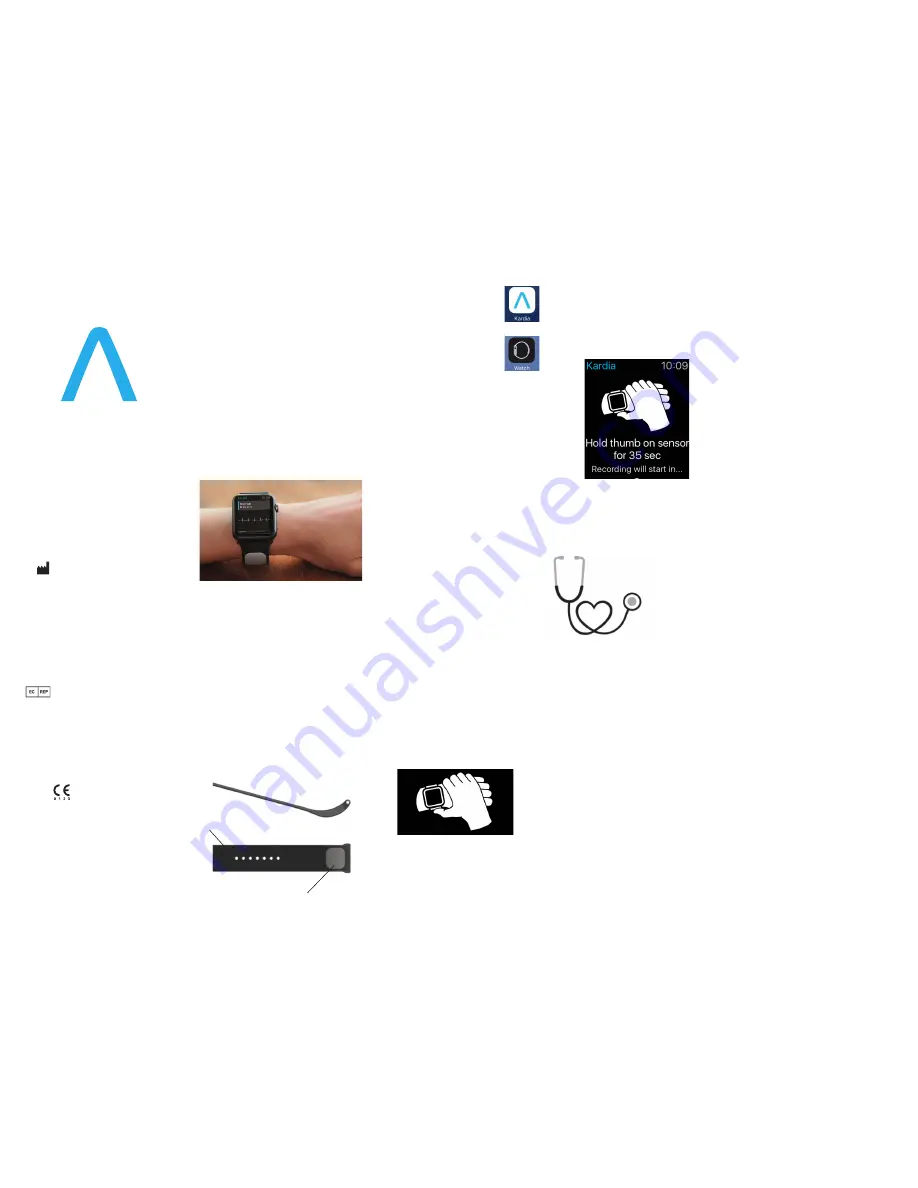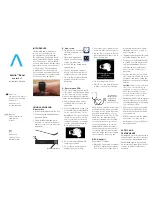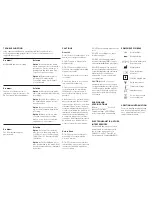
Kardia™ Band
by AliveCor
®
Instructions For Use
AliveCor, Inc.
444 Castro Street, 6th Floor
Mountain View, CA 94041
United States
www.alivecor.com
Tell: 650-396-8650
Obelis SA
BD General Wahis 53
1030, Brussels
Belgium
Made in USA
15LB1 Revision 2 |
OCTOBER 2016
INTENDED USE
The Kardia Band is intended to
record, store and transfer sin-
gle-channel electrocardiogram
(ECG) rhythms. The Kardia Band
also displays ECG rhythms and de-
tects the presence of atrial fibrilla-
tion and normal sinus rhythm (when
prescribed or used under the care
of a physician). The Kardia Band
is intended for use by healthcare
professionals, patients with known
or suspected heart conditions and
health conscious individuals.
USING KARDIA BAND
A. Assembly
• Remove Kardia Band from the box.
• Remove existing watchband from
your Apple Watch.
• Attach both Kardia Band pieces
to the watch – the electrode piece
attaches to the 6 o’clock side of the
watch body.
B. App set up
• On your iPhone, download
the Kardia app from the
App Store.
• Open the Apple Watch
app on your iPhone and
tap the My Watch tab.
• Scroll to find the Kardia watch
app and tap it.
• Tap the “Show app on Apple
Watch” and “Show in Glances”
toggles to turn on each feature.
• On your iPhone, tap the Kardia
app and follow the onscreen
instructions.
C. Recording an ECG
NOTE: These instructions are specific
for those who wear their Apple Watch
on their left wrist. If you wear your
watch on your right wrist, follow the
instructions by swapping left and right.
• Tap the Kardia watch app on
the Apple Watch to open the
application.
• With your right hand, grasp your
left hand. Rest your right thumb
on the outer electrode on the
Kardia Band. The inner electrode
should be in contact with the
skin of your left wrist. Remain
still while recording – your watch,
forearm, and hands should not
move while recording.
• Do not use Kardia Band while
charging your watch.
• Do not take a recording while
driving or physical activity.
• Do not take a recording if the elec-
trodes are dirty. Clean them first.
• Tap the “Record” button. Ensure
that your hands and fingers are in
the proper position.
• The recording takes 35 sec.
• After 35 sec, you have the option
to Save or Cancel the recording.
A U.S. board-certified cardiologist
will automatically review your first
recording for free and will provide
a medical interpretation of your
ECG within 24 hours. Due to FDA
regulations, the heart rhythm for
your first recording will not be visible
on your mobile device screen and
you will not be able to record any
additional ECGs while the cardiolo-
gist is preparing your report. After
you receive your report notification
email, you will be able to record and
view as many ECGs as you like.
D. ECG Analysis
Subsequent recordings:
• After an ECG recording is complete,
the ECG is analyzed to determine
if it is at least 30 seconds long, if
it is Normal, Unclassified, if Atrial
Fibrillation is present, or if it is too
noisy to interpret.
• Tapping the analysis result displays
a detailed display of the result.
• Presence of Atrial Fibrillation (AF)
in your ECG results may present
only potential findings. If you are
experiencing any symptoms or
have concerns, contact your
physician.
• Normal results mean your heart
rate is between 50 and 100 beats
per minute, and shape, timing and
duration of each beat is considered
normal.
CAUTION
: AliveCor does not guarantee
that you are not experiencing an
arrhythmia or other health conditions
when labeling an ECG as normal.
You should notify your physician for
possible changes in your health.
• Unreadable ECG results determines
that you didn’t have proper ECG
recording for analysis. You might try
to re-record your ECG.
• ECG reports viewed at any mag-
nification other than 100% may
appear distorted and could lead
to misdiagnosis.
• All ECGs are synced to the Kardia
phone app. You may use the
phone app to send your ECGs for
physician analysis.
SAFETY AND
PERFORMANCE
Kardia Band was extensively tested in
clinical studies. Overall, 23 volunteers
over 18 years old participated in the
Kardia Band studies representing
46 recordings. During these clinical
studies, no adverse events were
observed.
Free medical
interpretation
of your first
ECG reading
For the United States only.
band
electrodes (sensor)




















